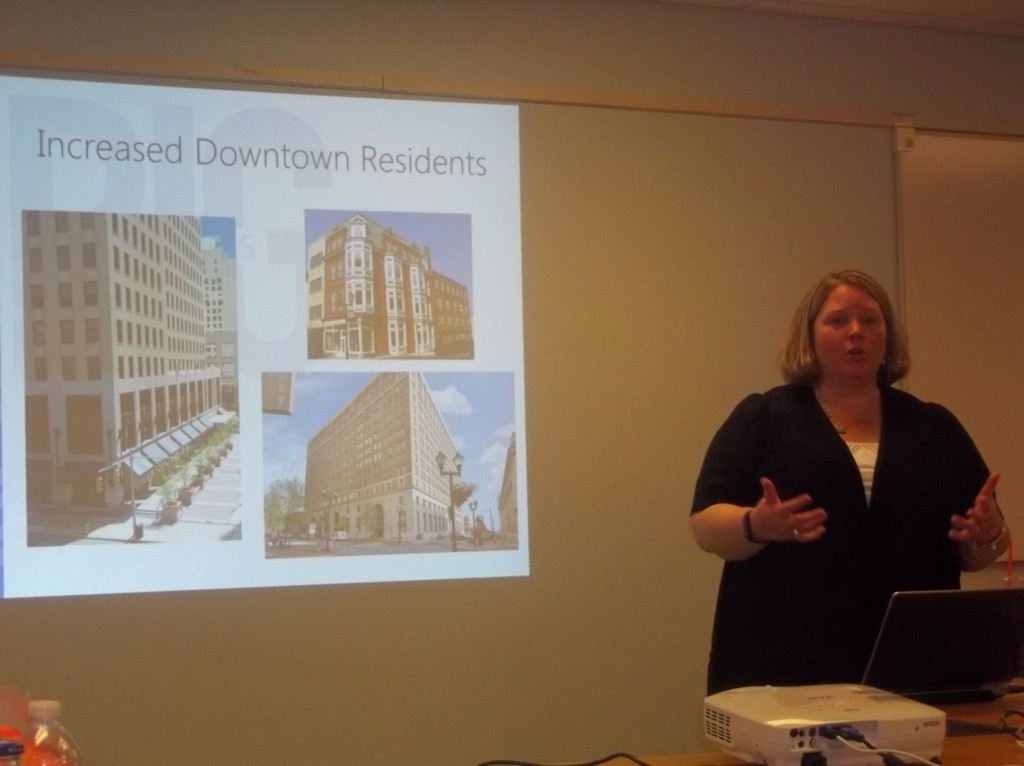One of the unique components of the Washington Fellowship is the opportunity for fellows to be involved in community service as part of the curriculum. While this has not been possible at the University of Delaware, the fellows are receiving a feel of community service in the US through sight visits to several non-profit organizations throughout their tenure at the institution. Accordingly, the fellows visited two non-profit organizations Friday morning to learn about their services and the communities that they serve. Nineteen fellows visited Wilmington Renaissance Corporation (WRC) in Wilmington, DE, while the other six fellows visited the Center for Community Justice (CCJ) in Milford, DE.
Founded in 1993, WRC (http://www.bigideaswilmington.com/WRC) generates ideas geared toward the development of downtown Wilmington into a more creative and economically vibrant community and convenes relevant stakeholders to transform these ideas into sustainable development projects. This has resulted in the community undertaking several development projects that have radically changed the landscape of this part of the city, as well as the people who live in it. These projects include the refurbishment of dilapidated unoccupied businesses and residential apartments, the creation of shared spaces, the establishment of an art college, and the hosting of art performances in the city. The organization is also working on more projects like this for implementation in the future.
 Beyond just hearing about what Wilmington Renaissance Corporation does and the communities that the organization serves, the fellows also had a chance to see part of the developments in downtown Wilmington. The fellows and engagement leaders by themselves walked along one of the major roads in downtown Wilmington where they shopped and ate lunch before returning to the university campus for the afternoon session.
Beyond just hearing about what Wilmington Renaissance Corporation does and the communities that the organization serves, the fellows also had a chance to see part of the developments in downtown Wilmington. The fellows and engagement leaders by themselves walked along one of the major roads in downtown Wilmington where they shopped and ate lunch before returning to the university campus for the afternoon session.
 The Center for Community Justice (http://peoplesplace2.com/programs-services/center-for-community-justice/) provides mediation services to resolve conflicts for individuals and organizations as an alternative mechanism to the court system. This is a cheaper and more effective way of resolving conflict for the parties involved as proved by the high success rate in most cases.
The Center for Community Justice (http://peoplesplace2.com/programs-services/center-for-community-justice/) provides mediation services to resolve conflicts for individuals and organizations as an alternative mechanism to the court system. This is a cheaper and more effective way of resolving conflict for the parties involved as proved by the high success rate in most cases.
After returning from the site visits, all the fellows convened at Memorial Hall for a debriefing session, which was led by the fellowship’s academic director, Professor Gretchen Bauer. During the session, fellows shared what they had learned during the site visits and commented on some of the academic sessions and site visits that they had during the past few weeks. Following this, Professor Bauer and the engagement leaders gave the fellows some announcements in relation to the visit to Rehoboth Beach on Saturday and some of the future academic sessions.
The last item on Friday’s program was an ice cream social. The ice cream that was served at the social was made using fresh milk from the university’s own dairy farm. UD’s agricultural college was responsible for production and operates an ice cream shop, UDairy Creamery (http://ag.udel.edu/creamery/), on campus. In addition to offering tasty ice cream from the university, the social also created a platform for fellows to interact with participants of the university’s other summer programs. This marked the end of the official business of the day.





